Physical Address
304 North Cardinal St.
Dorchester Center, MA 02124
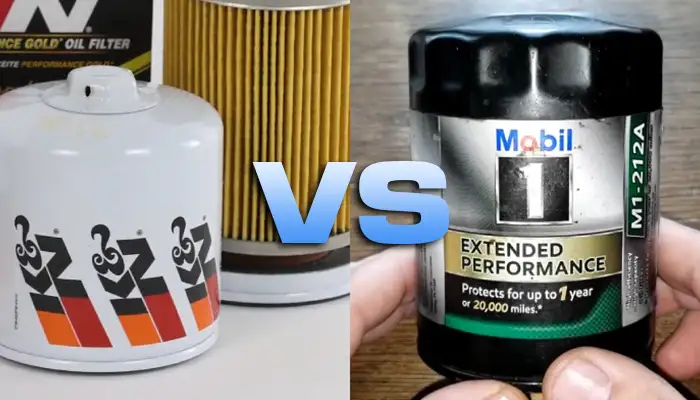
The choice of an oil filter is a critical decision for vehicle owners, as it directly impacts engine health and longevity. Among the numerous options available in the market, two renowned brands often garner attention: K&N and Mobil 1.
As a car enthusiast, I’ve always wondered about the differences between K&N and Mobil 1 vehicle oil filters. I found that K&N filters with higher micron ratings and compatibility with various motor oils offer a lower filtration efficiency of around 80-85% due to their synthetic media.
In contrast, Mobil 1 filters offer exceptional filtration efficiency using a blend of synthetic and cellulose fibers, removing up to 99% of contaminants from oil.
In this article, I’ll dive deep into the technical aspects of these two oil filters, including their mileage intervals and oil & vehicle compatibility. So buckle up and get ready to uncover the truth behind these popular choices.
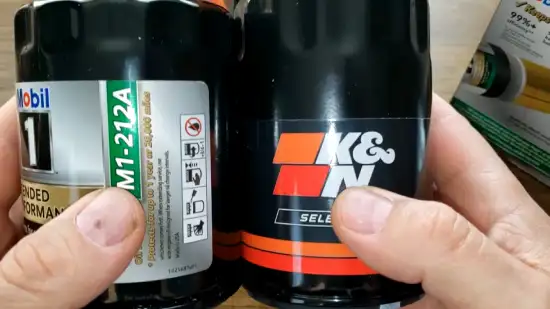
Several key points stand out when comparing K&N and Mobil 1 oil filters for vehicles, according to my research. Here, I will mention them.
I prefer the filtration material in the Mobil 1 oil filter over that of the K&N oil filter. The Mobil 1 oil filter utilizes a synthetic fiber blend with microfiber glass, which provides superior protection and filtration efficiency.
The microfiber glass in the filtration material is particularly beneficial in high-temperature environments and heavy-duty usage scenarios.
It can capture and remove up to 99% of contaminants, ensuring the engine oil remains clean and free from harmful particles. This is especially important in maintaining the longevity and performance of the engine.
On the other hand, the K&N oil filter uses a combination of synthetic fibers and cellulose for filtration. While effective, this blend of materials doesn’t achieve the same filtration efficiency as the microfiber glass in the Mobil 1 oil filter.
The micron rating distinguishes the K&N and Mobil 1 oil filters regarding their filtration capabilities. K&N filters have a higher micron rating of around 30, allowing larger particles to pass through their filtration media.
Alternatively, Mobil 1 filters have a lower micron rating of about 20, indicating their ability to filter out smaller particles more effectively than K&N.
The difference in micron ratings reflects the different levels of filtration precision provided by these filters. A higher micron rating may be suitable for applications where larger particles are a concern, such as off-road vehicles or heavy-duty equipment.
In contrast, a lower micron rating is beneficial in applications where finer filtration is required, such as high-performance engines or extended oil change intervals.
As I know, K&N filters have a larger capacity for holding dirt, holding 56 grams of dirt. This makes them suitable for longer intervals between oil changes, as they can effectively trap and retain a significant amount of contaminants.
On the other hand, Mobil 1 filters have a smaller dirt-holding capacity, capable of holding up to 28 grams of dirt. While still effective at trapping dirt, their smaller capacity means they may require more frequent changes compared to K&N filters.
When comparing the mileage intervals of K&N and Mobil 1 oil filters for vehicles, one significant difference becomes apparent.
K&N filters are designed to last for an impressive 50,000 miles before requiring an oil change. This is significantly longer compared to Mobil 1 filters, which recommend intervals of 15,000 to 20,000 miles.
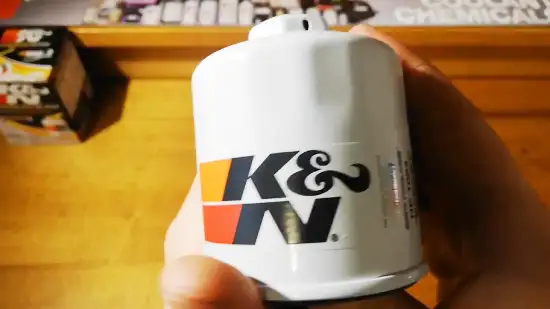
K&N filters have a higher bypass valve pressure, typically 30 to 45 psi. In contrast, Mobil 1 filters open at around 22 psi.
The higher bypass valve pressure of K&N filters provides an advantage in situations where the oil filter experiences sudden increases in pressure. This allows the K&N filter to maintain oil filtering capability even under extreme conditions.
Alternatively, the lower bypass valve pressure of Mobil 1 filters may cause them to open earlier, potentially reducing their filtering efficiency in similar conditions.
Filters from K&N offer a variety of oil options. They can be used with conventional, synthetic, and blended motor oils. This allows for flexibility in selecting the type of oil that best suits your vehicle’s needs.
In contrast, Mobil 1 filters are primarily designed for use with synthetic oils. While they can also be used with conventional oils, they may not be as compatible or well-suited for this purpose as K&N filters.
Therefore, if you frequently switch between different types of oils, I think the K&N filter may be a better option for you.
K&N filters provide a filtration efficiency in the range of 80 to 85%, which effectively removes a substantial portion of contaminants from the engine oil.
However, Mobil 1 filters surpass K&N filters in terms of filtration efficiency. They can remove up to 99% of contaminants, ensuring a higher level of cleanliness for the engine oil.
This superior filtration efficiency is achieved through advanced filter media and design. Mobil 1 filters improve engine performance and longevity by effectively capturing and trapping a large percentage of contaminants.
The oil flow rates of K&N and Mobil 1 oil filters for vehicles differ significantly. This difference in oil flow rate is an important factor to consider when choosing an oil filter for your vehicle.
K&N filters are known for their higher oil flow rate, making them ideal for high-performance vehicles and racing conditions. The increased oil flow rate of K&N filters allows for better lubrication and cooling of engine components, which can improve overall performance.
On the other hand, Mobil 1 filters may not have as high of an oil flow rate, but it’s generally sufficient for most applications. Although optimal oil flow is important, Mobil 1 filters provide adequate lubrication and protection for your vehicle’s engine.
K&N filters are known for their compatibility with high-performance vehicles, motorcycles, and racing cars, especially those using thicker oils. However, they may not be suitable for smaller vehicles due to potential compatibility issues.
Conversely, Mobil 1 filters are designed to be more versatile and compatible with a broader range of vehicles, including most modern engines. This makes them a reliable choice for a wider variety of vehicles.
As far as I know, K&N oil filters are more expensive than Mobil 1 filters. This can be attributed to the superior quality and performance that K&N filters offer.
K&N filters are made with advanced filtration technology, ensuring they effectively remove contaminants from the engine oil. They’re also designed to have a longer lifespan, reducing the frequency of filter changes.
On the other hand, Mobil 1 filters are typically more affordable, making them a popular choice among budget-conscious consumers.
Despite the price difference, both filters are dependable options for maintaining the health and longevity of your vehicle’s engine.
| Feature | Mobil 1 Oil Filter | K&N Oil Filter |
| Filtration Material | Synthetic fiber blend with microfiber glass | Combination of synthetic fibers and cellulose |
| Micron Rating | Lower (around 20) | Higher (around 30) |
| Dirt-Holding Capacity | Smaller capacity (up to 28 grams) | Larger capacity (up to 56 grams) |
| Mileage Intervals | 15,000 to 20,000 miles | Impressive 50,000 miles |
| Bypass Valve Pressure | Opens at around 22 psi | Higher (30 to 45 psi) |
| Oil Compatibility | Primarily designed for synthetic oils | Compatible with conventional, synthetic, and blended oils |
| Filtration Efficiency | Up to 99% | 80 to 85% |
| Oil Flow Rate | Adequate for most applications | Higher flow rate, suitable for high-performance and racing conditions |
| Specific Vehicle Compatibility | Versatile, compatible with a broad range of vehicles | Suitable for high-performance vehicles, motorcycles, and racing cars, but may have compatibility issues with smaller vehicles |
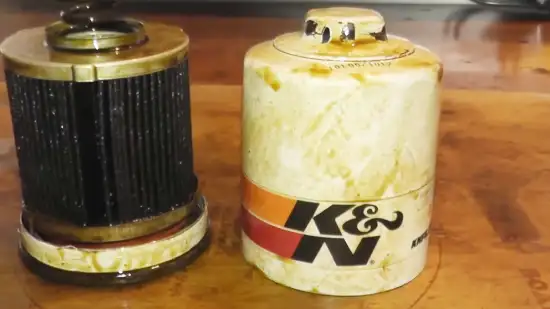
My knowledge of K&N oil filters has shown a noticeable difference in engine performance and longevity.
The high-quality materials used in K&N filters allow for outstanding filtration of contaminants, ensuring that only clean oil circulates through the engine. This not only improves engine performance by preventing dirt and debris from clogging vital components, but it also extends the life of the engine.
Additionally, K&N filters provide consistent oil flow of various types of oils, maintaining optimal lubrication throughout the engine. This is crucial for reducing friction and wear, leading to smoother operation and increased longevity.
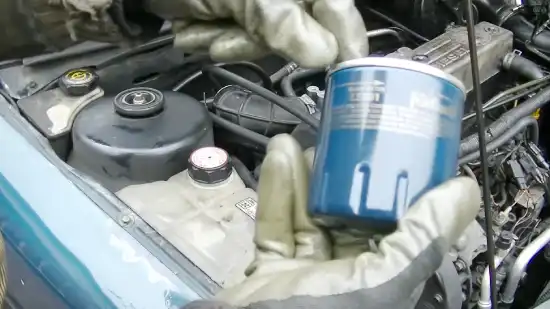
I frequently believe that Mobil makes excellent oil filters for vehicles. Their Mobil 1™ Extended Performance Oil Filters offer superior engine protection, especially when used with Mobil 1™ advanced full synthetic motor oil.
These oil filters utilize synthetic blend media, effectively removing contaminants from the oil, resulting in cleaner oil and improved engine performance. The synthetic blend media is designed to capture and hold more dirt and debris compared to conventional filters, ensuring that the engine remains clean and operates optimally.
After analyzing the differences between K&N and Mobil 1 oil filters, I think both brands offer high-quality options for vehicle maintenance.
K&N filters are known for superior filtration capabilities thanks to their synthetic blend filtration material. This allows them to capture more contaminants, such as dirt and debris, even in harsh conditions. Additionally, K&N filters have a higher micron rating, which means they can catch smaller particles that others might miss.
On the other hand, Mobil 1 filters are lauded for their impressive durability and efficiency. They feature a strong inner core that allows reliable filtration, even under high pressure.
So, in my opinion, if you choose K&N or Mobil 1, rest assured that both brands will meet your vehicle’s oil filtering needs with utmost precision and reliability.